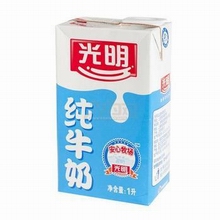 China's second-largest food manufacturer by revenue is looking at potential targets in Southeast Asia, Australia and Brazil, vice president Ge Junjie told Reuters on Thursday.
China's second-largest food manufacturer by revenue is looking at potential targets in Southeast Asia, Australia and Brazil, vice president Ge Junjie told Reuters on Thursday.An estimated 6 million tonne surplus in global sugar supply means it's a good strategic time to buy, Ge said, adding the company was also interested in expanding its international portfolio in wine, cookies, chocolate, and dairy.
"The next step in our international strategy is sugar. At the moment Chinese per capita sugar consumption is only 10 kilograms a year; the international average is 15 kilograms," said Ge, who has spent his career in the sugar industry, working for state-owned Shanghai Sugar, Cigarette and Wine Group before it was merged into Bright Food in 2006.
"As China urbanizes and the Chinese people's consumption spending increases, average sugar consumption will rise. So that's good for us as a discretionary food company."
Bright Food targets total revenues of 150 billion yuan within the next three years, implying average growth of 12 percent a year. It expects its international sales to account for 25 percent of revenue by 2015, up from 15 percent now.
Bright Food is considering an overseas listing, Ge said, without elaborating. The group has four units listed in Shanghai: Shanghai Jinfeng Wine Co, Shanghai Haibo Co, Shanghai Maling Aquarius Co and Bright Dairy & Food Co.
Bright Food bought a controlling stake in British cereal maker Weetabix last year, following on its 2011 purchase of Australian biscuit, fruit and dairy producer Manassen Foods in 2011. In 2010, it bought a majority stake in New Zealand's Synlait Milk. The same year, it was outbid in an effort to buy the sugar and renewable energy unit of Australian conglomerate CSR.
Bright Food generally targets overseas brands that have strong sales networks and want to penetrate the growing Chinese market.
"No matter how good the product is, if there is no synergy with the China market, we won't pursue it," he said.
Bright Food, the nation's fourth-largest dairy producer, has invested in dairy farms over the past few years in line with government requirements that dairy producers control their supply sources.
A 2008 scandal in which at least 6 babies died and 50,000 were hospitalized after drinking formula tainted with the chemical melamine was blamed in part on dairy processors' practice of buying milk from small, independent dairy farmers.
Over 70 percent of Bright Food's raw milk supply is from its own farms, Ge said, built over the past two years with 50,000 cows imported from Australia. The company is also investing in feed production, in a departure from its usual focus on retail and distribution.





